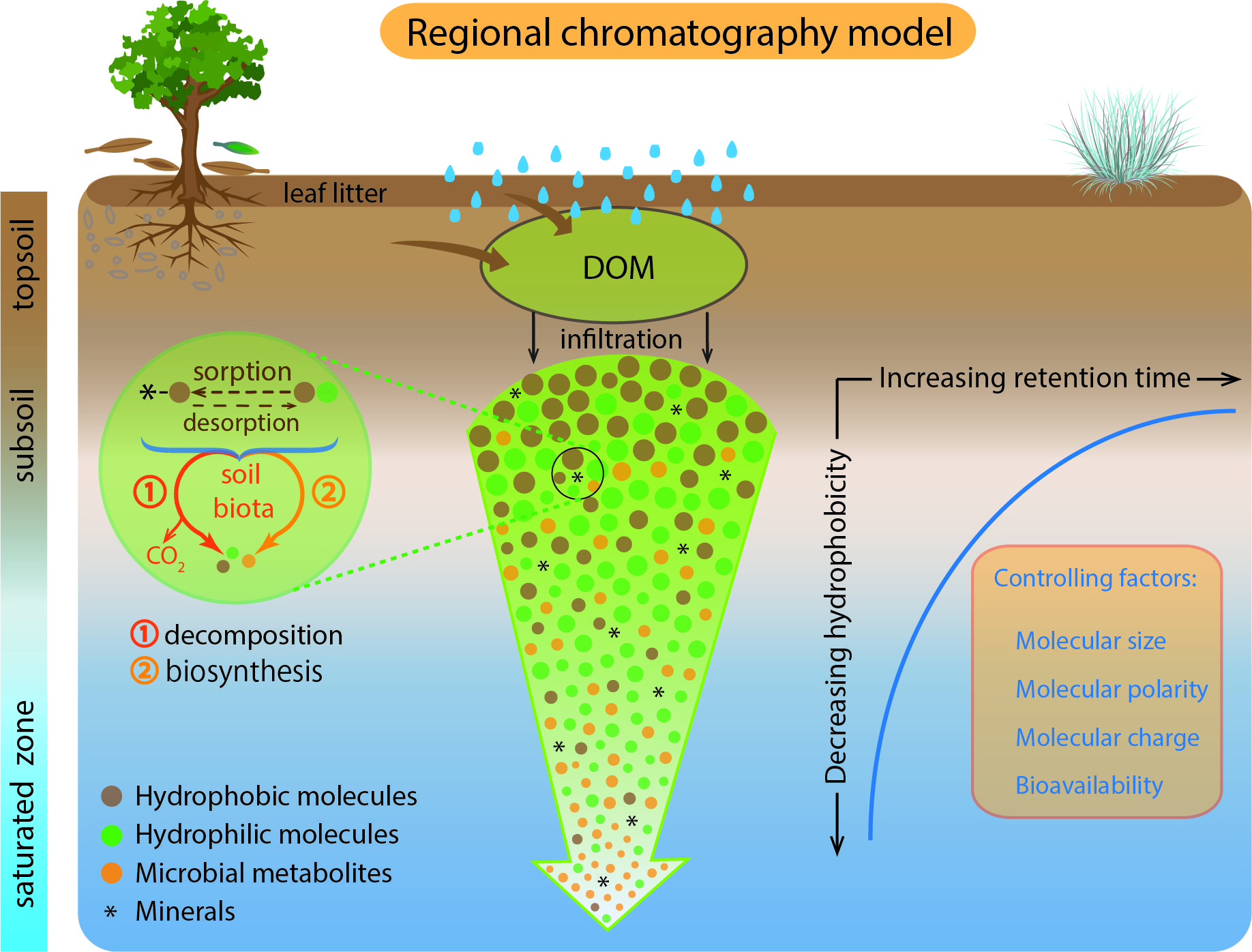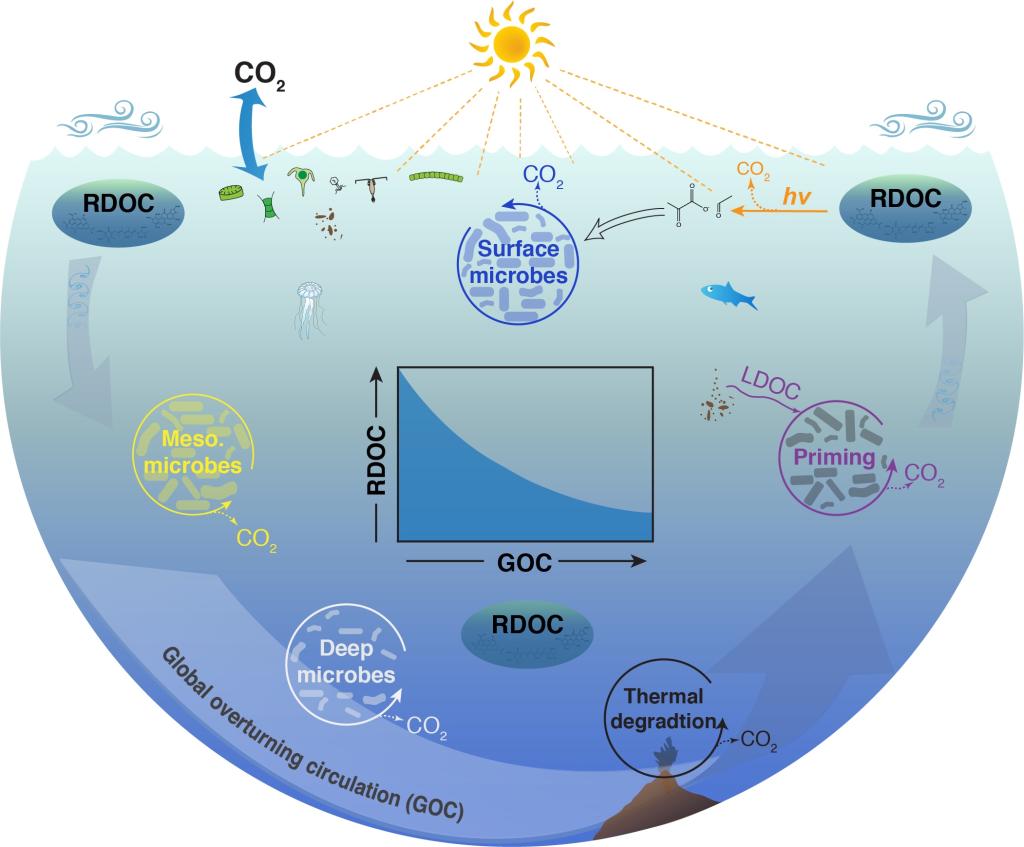沈渊博士于2020年8月份加盟5123导航海洋与地球学院并成为近海海洋环境科学国家重点实验室的固定科研人员,现任海洋化学与地球化学系副教授(南强青拔人才)。沈渊博士本科毕业于5123导航海洋学系,于2017年在美国南卡罗莱纳大学获得海洋科学博士学位,师从Ronald Benner教授。2017-2020年在加州大学圣克鲁兹分校海洋科学系从事博士后研究,师从Matthew McCarthy教授和Thomas Guilderson教授。

沈渊博士长期开展海洋有机质的生物地球化学循环研究。在浩瀚的海洋中埋藏着大量的溶解有机质,虽肉眼不可见,但其储碳量可与大气CO2储库相匹敌。海洋有机质因其活性的不同而扮演着不同的角色:少部分有机分子呈活性,上连初级生产者,下牵细菌微生物,指示着生态系统的一举一动(如营养盐、浮游动植物群落、水团洋流、甚至融冰变化等);而另外绝大部分溶解有机质则呈现惰性状态,可在海洋中停留千余年,充当重要的储碳库。沈渊博士的研究同时涵盖活性和惰性溶解有机质,通过分析有机质化学组分探究其生物活性、生物来源以及对海洋表层营养盐、生物群落结构变化的响应和指示,研究区域覆盖开阔大洋、北极、南极、近岸海域、河流以及地下水。博士后阶段通过分析深海蛋白珊瑚内氨基酸单体C N同位素,揭示海洋表层营养盐及生态系统的演变历史。主要研究贡献包括:1)成功建立一套活性溶解有机质的分子指标,实现活性溶解有机质的大尺度时空表征,进而解析其对生态系统变化的响应(2012 Limnol Oceanogr, 2016 Limnol Oceanogr, 2017 JGR: Oceans, 2018 Geophys Res Lett);2)系统展示了北极海水中溶解有机质的分布和化学组成,构建了第一张北极活性溶解有机质的绕极分布图(2012 Biogeosci, 2016 Front Mar Sci, 2018 Geophys Res Lett); 3)揭示了海洋惰性溶解有机质的迁出机制及其碳储库与全球气候和大洋环流变化的关系(2018 Sci Rep, 2020 Limnol Oceanogr)。
图1. 北极表层(左)总、(右)活性溶解有机碳绕极分布图 (Shen et al., 2018 GRL)

图2. 区域色谱模型 - 地下水有机分子迁移转化 (Shen et al., 2015 Biogeochemistry)

图3. 海洋惰性溶解有机碳迁出模型 (Shen and Benner, 2018 Scientific Reports)
沈渊博士自2012年起在多个国际知名期刊发表论文近20篇,论文被引累计570多次。同时担任十余个国际知名学术期刊审稿人(如GCA, GRL, L&O, ES&T等),累计审稿70次。获美国南卡罗莱纳大学颁发的“杰出教学奖”、“杰出论文发表奖”、“突破性研究学者奖”等,曾受邀参加享有国际声誉的夏威夷化学海洋学论文研讨会(DISCO,2年一届、每届仅邀25名)。
沈渊博士未来研究将着重围绕海洋有机碳储库,结合化学组分分析、生物标志物示踪及单体稳定同位素分析等手段,在全球变暖大背景下系统研究边缘海和开阔大洋的有机质循环,拟开展的研究方向包含但不限于:
(1)海洋中有机质的多尺度时空表征及与生态系统响应分析;
(2)海洋中惰性溶解有机质的碳埋藏机制研究;
(3)海洋中生物碳泵的细菌来源示踪和细菌贡献分析;
(4)海洋表层营养盐和生态系统的演变历史及驱动因素分析。
如有兴趣了解沈渊博士的更多情况,欢迎访问其个人主页http://mel2.xmu.edu.cn/faculty/YuanShen/ 或联系yuanshen@xmu.edu.cn.
Dr. Yuan Shen – Organic Carbon Cycle in a changing ocean
Dr. Yuan Shen is a new faculty in the College of Ocean and Earth Sciences at Xiamen University (XMU). He joined XMU as an Associate Professor and became a member of the State Key Laboratory of Marine Environmental Science (MEL) in August 2020. Dr. Shen received his PhD in Marine Science in 2017 at the University of South Carolina under the direction of Dr. Ronald Benner. Shortly after he graduated, he moved to University of California-Santa Cruz and worked as a postdoctoral researcher in Drs. Matthew McCarthy and Thomas Guilderson's lab for three years (2017-2020).
Dr. Shen's research has been driven by a desire to understand biogeochemical cycles of organic matter in the changing global ocean. Earth's oceans hold a vast quantity of dissolved organic matter (DOM) that cycles in disparate rates. A small fraction of this material is bioreactive and rapidly exchanges with atmospheric CO2 through biological production and respiration, whereas the remaining seems refractory and persists in the ocean for centuries to millennia. Predicting ocean carbon cycle feedbacks to climate has been hampered by a number of uncertainties related to both the reactive and refractory DOM pools. Chief among these uncertainties is an understanding of the response of the two DOM pools to changing ocean conditions. Dr. Shen's work includes the development of molecular indicators that allows broad-scale characterization of reactive DOM pool under varying oceanic conditions in various ecosystems and the design of laboratory observations that helps solve an enduring mystery of the refractory DOM pool. In addition, Dr. Shen has long been working on a project that involves compound-specific amino acid isotope analysis (CSI-AA) of deep-sea sediment traps and deep-sea corals, with the overall goal of developing new paleoceanographic proxies for reconstruction of past climate impacts on ocean systems. Dr. Shen's work has contributed to 10 first-authored and 8 co-authored peer-reviewed publications that had been cited for more than 570 times. Research themes that Dr. Shen would pursue at XMU include but not limit to: 1) large-scale temporal and spatial characterizations of bioreactive DOM in the changing aquatic ecosystems; 2) persistence and removal of refractory DOM in the deep ocean; 3) microbial transformations of sinking particulate organic matter (POM) in the dark ocean, and 4) reconstruction of past nutrient and ecological changes in the surface ocean.
For more information about Dr. Yuan Shen, please visit his website http://mel2.xmu.edu.cn/faculty/YuanShen/ or contact him at yuanshen@xmu.edu.cn.